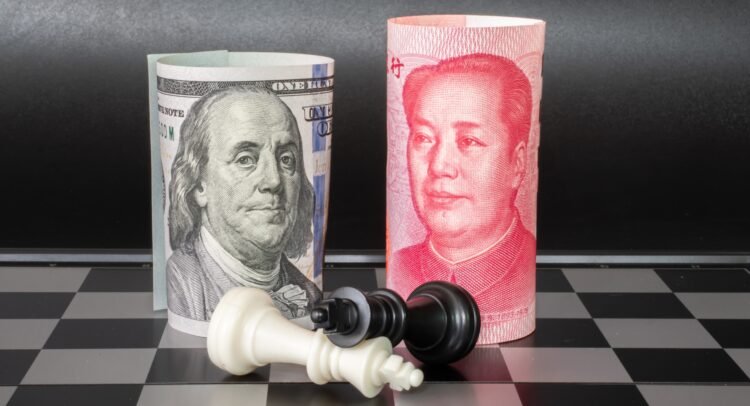The news that China will be dumping billions of dollars of US Treasury bonds from its vast holdings has stock market investors on edge and wondering what the impact will be. This is a wise move. Wise stock market investors should take a moment to understand how this will affect the entire financial “chessboard.” The economic reality is that nothing happens in a vacuum. Therefore, China’s actions may trigger a domino effect, which may indirectly affect the stock market through the nexus of related and seemingly unrelated factors.
Here are seven key concerns that have U.S. stock market investors putting their fingers on the sell button.
China selloff could push interest rates higher
If China were to sell off a lot of U.S. Treasuries, bond yields could spike. This would result in the increased supply from China’s sales not offsetting the increased demand. This is important for the stock market. The reason, of course, is that higher interest rates increase borrowing costs for companies, which could impact corporate profitability and stock prices. All of this could lead to lower corporate profitability and therefore lower stock prices.
Strong dollar and exchange rate
If China were to divest its dollar-denominated US Treasury holdings, the value of the US dollar could fall in the foreign exchange market. This is because China is exchanging US dollars for Renminbi (RMB) or gold. This would again weaken the dollar due to increased supply (without offsetting increased demand). This may seem like a boon to US exporters, as their products would become cheaper in foreign currencies.
The problem, however, is that a weaker dollar could make imported goods more expensive, increasing inflationary pressures that the Fed is determined to fight and may force it to raise interest rates.
Geopolitical tensions and potential conflict
China’s decision to sell U.S. Treasury bonds can be interpreted as a response to geopolitical and economic tensions between the two powers. This move could further exacerbate already fragile relations and lead to trade disputes and protectionist policies. Needless to say, such a development would cast a pall over the global economy, with stock markets likely to bear the brunt of the uncertainty.
Weakening investment opportunities
If China’s sell-off leads to higher interest rates and borrowing costs for companies, many stocks could become less attractive investments.
This is because rising debt costs can reduce a company’s profitability, which in turn can reduce investor interest in the stock, increasing selling pressure and causing share prices to fall.
Market volatility
China’s actions could create uncertainty in the stock market. Investors who are always sensitive to market volatility may become more cautious and take a wait-and-see approach. This could result in increased volatility and markets could move sharply in both directions.
Remember, volatility doesn’t necessarily lead to a downtrend, but it can create a nerve-wracking environment for even the most experienced investors.
Flight of money to safety
China’s withdrawal from U.S. Treasuries and simultaneous accumulation of gold can be interpreted as a lack of confidence in the U.S. economy and financial system. This could trigger a domino effect, leading other investors to follow suit and seek alternative assets that are perceived as safer investments. This could increase the likelihood of a decline in demand for U.S. assets, including stocks, leading to a decline in prices.
Boosting domestic production could boost inflation
In response to China’s actions, the United States may seek to strengthen its “Made in America” stance and reduce its reliance on other countries for essential goods, but the shift to domestic production could mean higher production costs for labor and materials for U.S. companies.
This would then create the problem of rising consumer prices, further increasing inflationary pressures and potentially leading the Fed to (you guessed it) raise interest rates.
Key Takeaways
While China’s sale of U.S. Treasury bonds may not directly affect the stock market, it can have an indirect effect through interest rates, exchange rates, geopolitical tensions and market sentiment. It is important to remember that the stock market is like a roller coaster and will always have its ups and downs.

